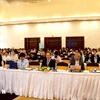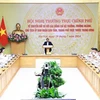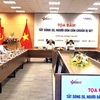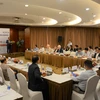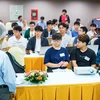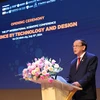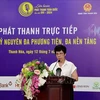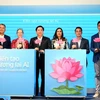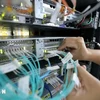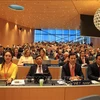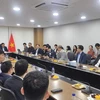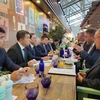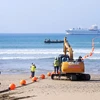Professor Dr Dang Vu Minh was re-elected as President of the Vietnam Union of Science and Technology Associations (VUSTA) for the 2015-20 tenure during the union’s seventh national congress in Hanoi on June 3.
Delegates at the congress also elected four Vice Presidents, a 173-member central council, a nine-member inspection committee, a 25-member presidium and a five-member presidium standing committee for the new tenure.
Over the next five years, the union is set to focus on promoting its strength in consultations, social critiques and appraisals while enhancing scientific research and the application of scientific and technological advances for environmental protection, community development and poverty reduction.
Meanwhile, the 140-member union will improve its role in gathering and promoting the creativity of Vietnamese intellectuals in science and technology, supporting the operation of member associations and increasing international cooperation.
By 2020, the union is expected to be a strong organisation contributing to making science and technology a motivating factor of the country’s economy and international integration as well as sustainable growth.
A club gathering overseas intellectuals will also be formed to call for their engagement in settling specific issues of the country.
Addressing the congress, Party General Secretary Nguyen Phu Trong stated that the intellectual circle plays a significant role in national construction and development, especially in the current period of industrialisation, modernisation and international integration as well as building a knowledge-based economy.
Investing in the intellectual circle is investing in sustainable development, he said.
Over the past 30 years, the VUSTA, a member of the Vietnam Fatherland Front, has become a venue for the unification of intellectuals in science and technology within and outside the country, providing a playground for them to make contributions to national construction and defence, said the Party chief.
He urged the union to stay active in implementing the Party Central Committee’s resolution on developing science and technology while working closely with the Ministry of Education and Training in renovating the education sector.
He asked the union to strengthen political education for intellectuals to help raise their sense of responsibility to the nation, deepening relations between the Party, State, people and intellectual circle.
The union should complete policies and mechanisms promptly to maximise the potential of the circle, he asked.
The union should also serve as a trustworthy advisory body for the Party and State, especially in gathering the brainpower of intellectuals, while contributing critical ideas to the Party and State’s policies and major socio-economic projects and programmes, as requested the leader.-VNA
Delegates at the congress also elected four Vice Presidents, a 173-member central council, a nine-member inspection committee, a 25-member presidium and a five-member presidium standing committee for the new tenure.
Over the next five years, the union is set to focus on promoting its strength in consultations, social critiques and appraisals while enhancing scientific research and the application of scientific and technological advances for environmental protection, community development and poverty reduction.
Meanwhile, the 140-member union will improve its role in gathering and promoting the creativity of Vietnamese intellectuals in science and technology, supporting the operation of member associations and increasing international cooperation.
By 2020, the union is expected to be a strong organisation contributing to making science and technology a motivating factor of the country’s economy and international integration as well as sustainable growth.
A club gathering overseas intellectuals will also be formed to call for their engagement in settling specific issues of the country.
Addressing the congress, Party General Secretary Nguyen Phu Trong stated that the intellectual circle plays a significant role in national construction and development, especially in the current period of industrialisation, modernisation and international integration as well as building a knowledge-based economy.
Investing in the intellectual circle is investing in sustainable development, he said.
Over the past 30 years, the VUSTA, a member of the Vietnam Fatherland Front, has become a venue for the unification of intellectuals in science and technology within and outside the country, providing a playground for them to make contributions to national construction and defence, said the Party chief.
He urged the union to stay active in implementing the Party Central Committee’s resolution on developing science and technology while working closely with the Ministry of Education and Training in renovating the education sector.
He asked the union to strengthen political education for intellectuals to help raise their sense of responsibility to the nation, deepening relations between the Party, State, people and intellectual circle.
The union should complete policies and mechanisms promptly to maximise the potential of the circle, he asked.
The union should also serve as a trustworthy advisory body for the Party and State, especially in gathering the brainpower of intellectuals, while contributing critical ideas to the Party and State’s policies and major socio-economic projects and programmes, as requested the leader.-VNA

